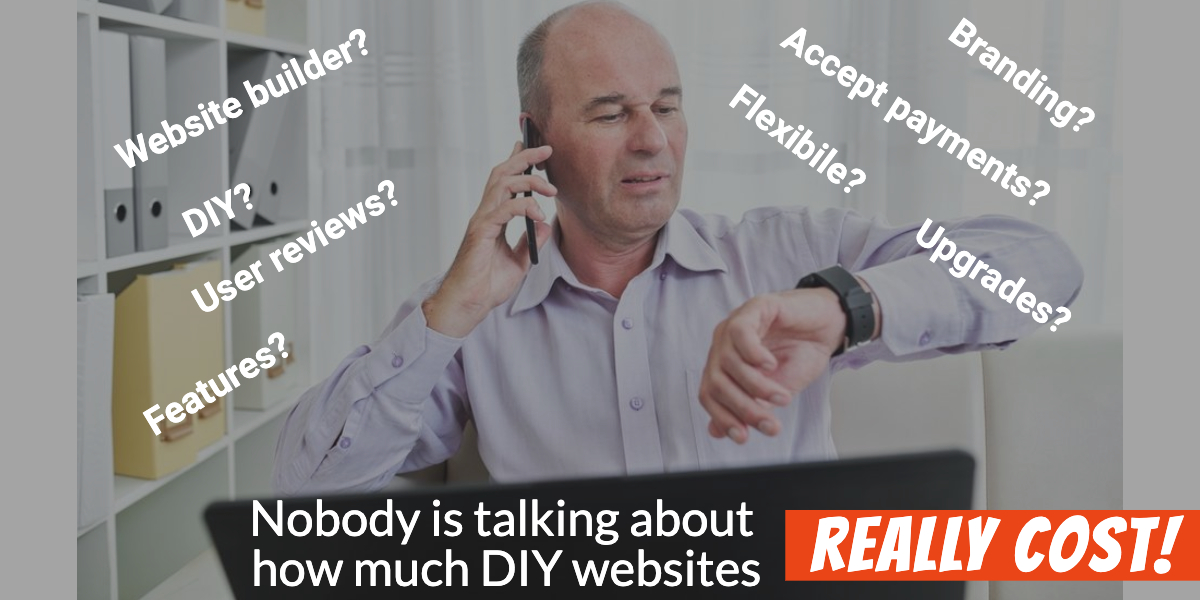Nobody is talking about how much DIY websites REALLY cost!
As most of you know, there are countless DIY website builders out there. They advertise themselves as the perfect solution for people who want to create their own website. The truth is, a lot of these companies aren’t really telling you the whole story. Yes, anyone can create a website, but it takes time and money to maintain it properly. If you are planning to build your own business website, you might be surprised at how many hours you will have to spend on it. The question is not should I build my own website, but should I build it myself or hire a professional to do it for me? We all know that when it comes to building your own website, you can either be smart and do it yourself, or be stupid and pay a professional, right? Well, that depends on whether you believe DIY is equal to free. With that in mind, let’s take a look at the real cost of DIY websites.
Time is Money. Don’t Throw it out the Window.
Before you even get started with your website, you really have two options. 1) You choose to methodically read through dozens or possibly hundreds of user reviews of different companies that offer a do-it-yourself solution. 2) you choose the do-it-yourself platform that is best marketed and save yourself the hassle of digging in the details of what they offer.
The problem with the first option is quite obvious — you waste lots and lots of time. You sort through offer after offer. You read comparisons of companies and what their platforms offer. You then read individual reviews of each tool and why some people are not satisfied with them. You then spend more time reading the reviews of people who are satisfied with their product. You get to know what features are important to different types of users and which tools have them. You think about your own needs, weigh them against what you see in other reviews, and make a decision that might not be perfect for you but is better than doing nothing at all.
The problem with the second option is less subtle — although you’ve chosen a well-known company or platform to start your website on, you don’t really know what kind of quality you’re getting. The worst part is that you don’t know what the best solution for your long-term goal is. Some companies get you locked into using their platform and later you realize that it doesn’t fit your situation. But you stick it out because you already put so much time and effort into it. It’s like trying to climb a wall at the end of a dead-end in an alley way because otherwise you have to retrace your steps back out and circle around. You’ll have to cut your losses and start on a platform that works for you.
DIY Website Builders Lack Features You Need
Everyone’s situation is different and that’s why you have to take each review, be it praise or criticism, with a grain of salt. In an ideal world, you would sit down and write down your ultimate goal in starting a website. Then, you would need to write down all the possible features you would need for that website. Based on that, you can identify which DIY website solutions would fit your situation. Unfortunately, very few people have enough experience to really be able to identify their needs. Quite simply, we don’t know what we don’t know. And, because of that, it’s hard to make a decision. You choose a DIY website builder and somewhere down the line you find that you cannot customize certain aspects of the layout, font, colors or some capabilities like accepting certain types of payments are missing altogether. It turns out that in order to get access to features you need, you have to upgrade to a plan that costs a pretty penny. This is when you realize why the choice you made was so inexpensive for the first year or on the first tier. The worst part is that you have been publishing content on your website and now you either pony up more money to keep your website growing or backtrack and switch. Do you really want to take a trip down that research stage of your journey again?
DIY Website Companies Restrict Your Potential
For most business owners who wish to grow their business, there are several limitations that DIY website builder platforms have. There is certainly a time and place for DIY website builders, but it’s more about being aware of your needs and setting out in the direction you wish to grow. The first restriction is not being able to brand your website the way you want for your audience and customers. DIY website builders like to try to keep their brand visible for visitors to see. The second restriction is that you’re not able to move your website anywhere easily. So if you decide in a year that it’s time for an upgrade, now you either put in more money continue growing your website for premium features or interrupt your business and migrate your website elsewhere. The third constraint to a DIY website company is the lack of flexibility and scalability. Because DIY companies are focused on starting, they often lack features to grow passed a certain point as a small to medium and certainly large business. The infrastructure often lacks the ability to support the long-term needs of a growing business. With these kinds of limitations, you find yourself spending yet more time doubting the choice you made or looking for an alternative.
What Costs Less, DIY or Hiring Out?
After we factor all of this into our opportunity cost calculator, we find that DIY websites cost us much more than hiring out the work to be done for us in most cases. That is, if our time is worth something to us. A statement I hope most of us wouldn’t debate. In answer to whether it costs less to outsource website work versus learning to do it yourself highly depends on 1) how much you value your time and 2) how good of a professional you work with. To help you figure out the answer to the first question, consider that a DIY website option will occupy at least a few hours of your time each week. If you earn $10 an hour and spend 8 hours a month on your website, that’s equivalent to $80, which doesn’t include the cost of the DIY website service.
When hiring someone to set up and design your website, consider the dynamics of your business and needs of the site. Will you need to change things on your website over time? Will you be publishing blogs, videos or other content on a regular basis? As your business grows, will you want to add more features to improve your customers’ experience? I hate to be the bearer of bad news here, but if you’re not doing those things, your competitors will overtake you. Be weary of any one-off quotes from professionals for setting up your site because you will most likely have a website with features you will have to replace down the line. Most one-time setups don’t take into account your long-term goals. Heck! Some of us wanting to start a website haven’t even identified our end goals mostly because we aren’t aware of all the ways we can grow and monetize a website. Be mindful of hiring someone who will take an interest in your business. They will ask questions to dig into the real purpose and potential of your website to provide you with solutions that fit your case, not just to offer a cookie-cutter website.
Ultimately, DIY websites can be a good idea for some people. They’re easy to create and require little or no technical knowledge to operate. But, the real cost of this option is hidden in what it takes to maintain them and update them with the latest information and integrating new features to keep on top of your competitors — an ongoing task that you’ll need help with if you’re going solo. Before taking the plunge and committing to a DIY website option, remember that most will absorb lots of your free time, which is why they are inexpensive, and most target people starting their business, not successfully growing their business. It’s finally time we focus on the real cost of DIY websites.
If you’re considering hiring someone to help you with your website, reach out to HG Pro, and we’ll be glad to discuss your ideas and niche with no pressure to choose any of our services. Contact us here.

